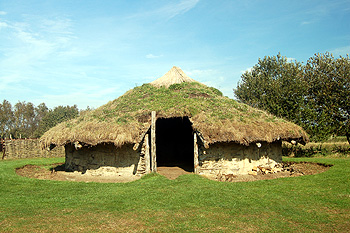Wingfield Before 1086

A reconstruction of a Bronze Age round house at Flag Fen October 2011
The Bedfordshire Historic Environment Record [HER] contains information on the county's historic buildings and landscapes and summaries of each entry can now be found online as part of the Heritage Gateway website. Parts of Wingfield were occupied at various times during the vast span of years making up prehistory.
Near Chalgrave Road, just north of Wingfield field waking has recovered flint tools dating from the Neolithic and Bronze Age [HER 16268]. It is a common misconception that with the beginning of the Bronze Age flint was no longer used. In fact it was in use for tools throughout the Bronze Age and into the Iron Age because there was a plentiful supply close at hand and the process of making flint tools was much quicker and easier, in skilled hands, than casting something in copper, bronze or iron.
South-east of Wingfield a large area of Iron Age and Romano-British occupation has been identified [HER 15811] on south facing slopes through field walking. Broken pottery found here goes right through the Iron Age. More Iron Age pottery, as well as some from the Middle Ages, has been found east of Wingfield [HER 16267]. A late Iron Age brooch was found south-west of Rose Farm in 2004 by a metal detectorist [18818].
An area of medieval earthworks, now ploughed out, south of Wingfield has yielded scatters of Roman pottery and tile [HER 1874]. An unidentified copper alloy object found in 2011 by a metal detectorist south of Hill Farm may be Roman in date [HER 19307]. In 1918, the rim of a Roman jar was found in the roots of a fallen tree in the parish [HER 3293].
The Dark Ages is that period beginning with the final withdrawal of Rome from Britain in 410 AD. It may be argued that this period, when the glories of the Classical World of Greece and Rome were forgotten and replaced by an intellectual recession and triumph of barbarism over civilization, stretched as far as the Renaissance when Classical learning was rediscovered. Traditionally, in England, it was held to end with the Norman Conquest of 1066. Such a view is, nowadays, unfashionable, and the term Early Medieval is generally preferred, but Dark Ages still has a popular resonance! In the 20th century a bronze ornament was discovered in the garden of a house in Tebworth Road, Wingfield. It dated from the 10th or 11th century and may have been a decorative mount [HER 17804].